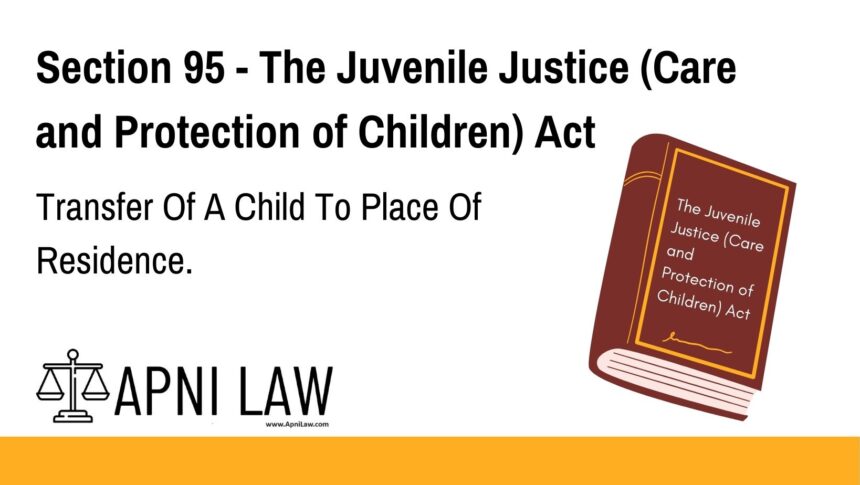Code: Section 95 – Transfer Of A Child To Place Of Residence
(1) If during the inquiry it is found that a child hails from a place outside the jurisdiction, the Board or Committee, as the case may be, shall, if satisfied after due inquiry that it is in the best interest of the child and after due consultation with the Committee or the Board of the child’s home district, order the transfer of the child, as soon as possible, to the said Committee or the Board, along with relevant documents and following such procedure as may be prescribed:
Provided that such transfer can be made in case of a child in conflict with law, only after the inquiry has been completed and final order passed by the Board:
Provided further that in case of inter-State transfer, the child shall be, if convenient, handed over to the Committee or the Board, as the case may be, of the home district of the child, or to the Committee or the Board in the capital city of the home State.
(2) Once the decision to transfer is finalised, the Committee or Board, as the case may be, shall give an escort order to the Special Juvenile Police Unit to escort the child, within fifteen days of receiving such order:
Provided that a girl child shall be accompanied by a woman police officer:
Provided further that where a Special Juvenile Police Unit is not available, the Committee or Board, as the case may be, shall direct the institution where the child is temporarily staying or District Child Protection Unit, to provide an escort to accompany the child during travel.
(3) The State Government shall make rules to provide for travelling allowance to the escorting staff for the child, which shall be paid in advance.
(4) The Committee or the Board, as the case may be, receiving the transferred child will process for restoration or rehabilitation or social reintegration, as provided in this Act.
Explanation of Section 95 JJ Act
Section 95 of the Juvenile Justice (Care and Protection of Children) Act deals with the process of transferring a child to their place of residence, particularly when the child is found to be outside their home jurisdiction during an inquiry.
This section ensures the following:
- The child’s best interest is prioritized before any transfer.
- If the child is in conflict with the law, the transfer can only happen after the inquiry and final order.
- Inter-State transfers are managed with care and convenience, possibly involving the home district or the State capital’s Committee/Board.
- Special Juvenile Police Units (or alternatives) must escort the child within 15 days of the transfer order.
- A girl child must be accompanied by a woman police officer.
- Escort travel expenses must be paid in advance by the State Government.
- Once transferred, the child’s new district authority will handle rehabilitation or reintegration.
Illustration
Example 1: Child from Another State Found in Conflict with the Law
A child from Odisha is found involved in a minor offence in Delhi. After completing the inquiry and final order, the Delhi Juvenile Justice Board, in consultation with the Odisha Committee, issues a transfer to Odisha and hands over the child to the Board in the State capital.
Example 2: Child in Need of Care, Transferred for Rehabilitation
A homeless child is rescued in Mumbai, but inquiry reveals they belong to a family in Rajasthan. The Child Welfare Committee in Mumbai consults with the Rajasthan Committee and arranges for safe transfer with a police escort. The child is then processed for rehabilitation by the local authorities in Rajasthan.
Common Questions and Answers on Section 95 JJ Act
1. When can a child be transferred to another jurisdiction?
A child can be transferred if it is found that they are from another jurisdiction and it is in their best interest to be moved, following consultation with authorities of their home district.
2. Can a child in conflict with the law be transferred during an ongoing inquiry?
No, in such cases, the transfer can only occur after the completion of the inquiry and the passing of a final order.
3. Who escorts the child during transfer?
Ideally, a Special Juvenile Police Unit. If unavailable, the institution housing the child or the District Child Protection Unit arranges for an escort.
4. What are the provisions for transferring a girl child?
A girl child must be accompanied by a woman police officer during the transfer.
5. Who bears the travel cost for escorting staff?
The State Government, which must provide travel allowance in advance as per the prescribed rules.
Conclusion
Section 95 of the Juvenile Justice Act safeguards the rights of children by ensuring their safe transfer to their home jurisdiction while prioritizing their best interests and well-being. It outlines a structured process that includes proper consultation, documentation, and safe escorting—ultimately facilitating rehabilitation and reintegration into society.
For more legal insights on juvenile justice and child protection, visit ApniLaw today.








